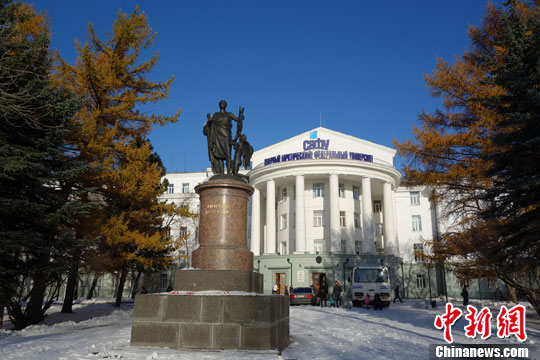

The nation should maintain close cooperation with Russia in the energy sector and accelerate a new natural gas pipeline project, said Vice-Premier Zhang Gaoli on Friday in Beijing during his meeting with Alexei Miller, president of Russia's state-owned natural gas giant Gazprom OAO.
Zhang said the two neighbors achieved great success in the energy industry last year and will focus on making their cooperation more effective for mutual benefit.
Based on bilateral agreements, China and Russia will accelerate the construction of a western natural gas pipeline linking Russia's Siberia and northwestern China.
"The two nations should also actively explore cooperation opportunities in upstream resources development, energy project construction and equipment manufacturing," Zhang said.
Miller said Russia would like to explore further energy cooperation.
Han Xiaoping, chief information officer of China Energy Net Consulting Co Ltd, said facing political pressure from the West and domestic financial difficulties, Russia needs to swallow its pride and cooperate with China intensively.
"The first item on Russia's agenda should be opening up its energy market for Chinese companies, which will be beneficial for both countries," Han said.
As a strong manufacturing country after years of development, China can contribute more to Russia's energy sector. For instance, PetroChina Co Ltd, the nation's biggest oil and gas producer, can bring advanced exploration technology to Russia.
"Chinese companies' oil and gas exploration equipment can also be brought to Russia for its energy industry growth," he said.
China and Russia signed a $400 billion natural gas supply contract in May, under which Gazprom will supply China with 38 billion cubic meters of gas annually for 30 years, starting in 2018, through the planned eastern pipeline.
The pipeline will connect Russia to China's northeastern Heilongjiang province and from there connect with the industrialized cities along China's eastern coast.
Russia and China intend to use their national currencies to settle more energy deals to guard against instability in a world energy market dominated by the US dollar, Russian President Vladimir Putin said on Nov 10, 2014.
"Direct settlement between the rouble and the yuan is very promising in the long run," Putin said in a speech at the Asia-Pacific Economic Cooperation CEO Summit. "If we can settle large deals in this way, it will mean the influence of the dollar in global markets will decrease."
Putin said China is a "priority partner" of Moscow, and the two countries are studying the possibilities of increasing the use of the Russian and Chinese currencies in bilateral trade and investment, in particular the energy sector.
Diversification in trade settlement will create greater stability in the world's financial and energy markets, Putin added.
His remarks were seen by analysts as a signal that the yuan is making sound progress toward becoming an established international currency as Beijing actively promotes its global profile.
Last month, China and Russia agreed on a currency swap worth 150 billion yuan ($24.5 billion), a move widely viewed as an effort to reduce the dollar's influence in both bilateral and international trade.
Jing Ulrich, vice-chairman of Asia-Pacific at investment bank JP Morgan, said, "Putin's mention of direct trade settlement between the rouble and the yuan makes sense as the yuan's internationalization is making good progress in global markets, and the trend will continue."
But she said the dominance of the dollar as a global reserve currency will not disappear overnight, and China needs to make the yuan fully convertible for it to be more accepted internationally.
In his speech, Putin said Russia has made the Asia-Pacific region a priority in its trade and investment policies. Trade with APEC members currently accounts for 25 percent of Russia's total trade volume, and Moscow is willing to raise the portion to 40 percent.
Russia also expects to boost investment in the Asia-Pacific region, which reached $1 billion over the past year, he added.
On Sunday, Russia and China signed a $400 billion deal for the construction of a pipeline that will supply 30 billion cubic meters of natural gas a year to China.
The two countries have also agreed to the purchase by China National Petroleum Corp of a 10 percent share of Vankorneft, a subsidiary of Russian oil giant Rosneft and operator of the lucrative Vankor oilfield.
Copyright ©1999-2018
Chinanews.com. All rights reserved.
Reproduction in whole or in part without permission is prohibited.